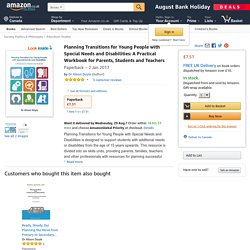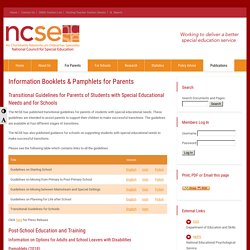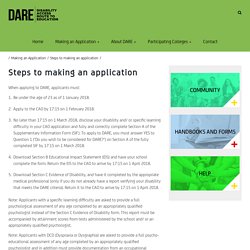

Planning Transitions for Young People with Special Needs and Disabilities: A Practical Workbook for Parents, Students and Teachers: Amazon.co.uk: Dr Alison Doyle: 9781910179932: Books. As a lecturer at university one comes across many students who have special needs or disabilities and the leap from school or FE study to university life can feel overwhelming.

This book is well overdue but at last it is here! Although it is geared to young people and parents as a workbook, it really should be on the shelves of every University or, even, offered to students through learning support. It certainly is the kind of tool that could be recommended reading to students at the point at which they have accepted a place at University in order for them to prepare for different standards and methods of teaching and learning. Campus life and negotiating the physical geography can also be daunting and this workbook seems to have thought of everything that a student might encounter and a way of working through it to achieve a positive outcome but, just as importantly, empowerment, control and confidence. Amazon. Information Booklets & Pamphlets for Parents. Transitional Guidelines for Parents of Students with Special Educational Needs and for Schools The NCSE has published transitional guidelines for parents of students with special educational needs.

These guidelines are intended to assist parents to support their children to make successful transitions. The guidelines are available at four different stages of transitions. The NCSE has also published guidance for schools on supporting students with special educational needs to make successful transitions. Please see the following table which contains links to all the guidelines. Click here for Press Release Post-School Education and Training Information on Options for Adults and School Leavers with Disabilities Pamphlets (2018) Booklet (2014) Information on Options for Adults and School Leavers with Disabilities: Post-School Education and Training Choosing a School A Guide For Parents and Guardians of Children and Young People with Special Educational Needs.
Choosing School 11 08 13W 060913. NCSE Post School Options. NCSE High Education Post School Options. NCSE Further Education Post School Options1. 5 NCSE 2016 Supporting Students final web 27.01.16. 02158 NCSE 2016 Life After School final 08.02.16. 02157 NCSE 2016 Changing Schools SpecialtoMainstream final 08.02.16. 02156 NCSE 2016 Changing Schools PrimarytoPost final 08.02.16. 02155 NCSE Starting School Guidelines final 08.02.16.
Steps to making an application – College. When applying to DARE, applicants must: Be under the age of 23 as of 1 January 2018.Apply to the CAO by 17:15 on 1 February 2018.No later than 17:15 on 1 March 2018, disclose your disability and/ or specific learning difficulty in your CAO application and fully and correctly complete Section A of the Supplementary Information Form (SIF).

To apply to DARE, you must answer YES to Question 1 (‘Do you wish to be considered for DARE?’) On Section A of the fully completed SIF by 17:15 on 1 March 2018.Download Section B Educational Impact Statement (EIS) and have your school complete the form. Return the EIS to the CAO to arrive by 17:15 on 1 April 2018.Download Section C Evidence of Disability, and have it completed by the appropriate medical professional (only if you do not already have a report verifying your disability that meets the DARE criteria). Return it to the CAO to arrive by 17:15 on 1 April 2018. The Supplementary Information Form (SIF) Section A – Applicant Information.